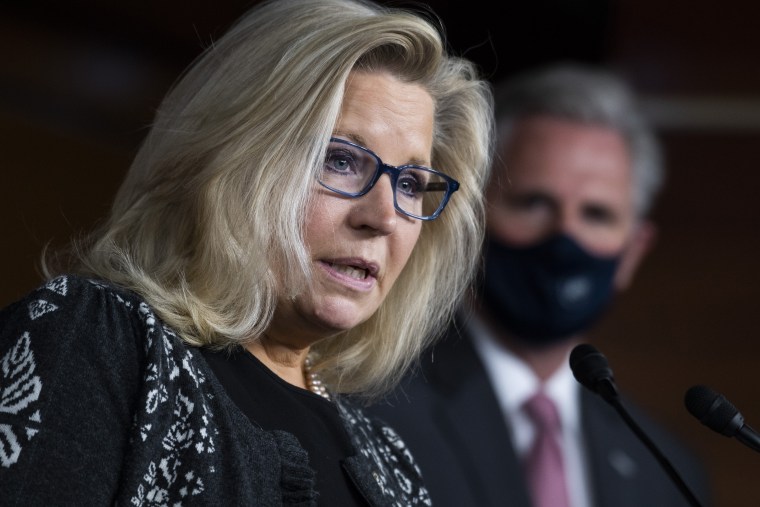After House Republican Conference Chair Liz Cheney (R-Wyo.) voted to impeach Donald Trump for inciting a deadly insurrectionist attack on the U.S. Capitol, more than a few GOP lawmakers said her partisan betrayal could not stand. Indeed, these far-right members had a specific goal: remove the Wyoming congresswoman from her leadership post.
By some measures, Cheney's opponents even had a chance of succeeding: Politico reported this week, "A group of hard-line conservatives ... says it has commitments from more than 100 colleagues who are willing to vote on a secret ballot to remove her."
It all seemed vaguely serious, right up until last night, when House Republicans met behind closed doors. NBC News reported on the outcome:
Liz Cheney, the third-highest-ranking Republican in the House, held on to her title as House GOP conference chair during a secret ballot Wednesday. Three sources said the vote among Republican House members was 145-61.
For now, to the extent that there were questions about whether Cheney would remain at her leadership post, those questions have been answered. Barring some kind of dramatic shift, the Wyoming Republican -- who did not apologize for her impeachment vote -- will remain the House GOP conference chair, at least for the next two years.
But that's not the only relevant takeaway from the developments. On the contrary, we learned a few related interesting things.
First, we learned that those supporting the far-right rebellion against Cheney had a lot fewer votes than they realized. Maybe they couldn't count well, or maybe some of their ostensible allies betrayed them when it came time to vote by secret ballot, but either way, the chatter from the anti-Cheney ringleaders about having "more than 100" votes wasn't even close to being true.
Second, on a related note, we learned that the outrage over pro-impeachment Republicans isn't quite as intense as we'd been led to believe. It's possible that if this same vote had been held a month ago, the outcome may have looked a little different, but as things stand, Cheney had little trouble persuading her GOP brethren to brush off her "offense," even as Donald Trump reportedly rails against the Wyoming congresswoman behind the scenes.
But at the risk of contradicting the first two observations, I'm not inclined to brush too quickly past last night's vote total: a 61-member contingent represents nearly 30% of the House Republican conference. That wasn't nearly enough to pose a serious threat to Cheney's political future, but it's not a meaningless fringe, either.
Six years ago, there was a reported "coup" attempt against then-House Speaker John Boehner, led in part by North Carolina's Mark Meadows, the future White House chief of staff. It didn't work, but the efforts to oust Boehner were led by a faction much smaller than 61 members, and it nevertheless generated considerable coverage of the intra-party drama.
All of which is to say, Cheney's keeping her job, but that doesn't mean House Republicans are unified.
Postscript: Later today, the House is scheduled to vote on whether to strip Rep. Marjorie Taylor Greene (R-Ga.) of her committee assignments. Don't be surprised if the number of Republicans voting to punish Greene is much smaller than the number of Republicans who voted to punish Cheney.

